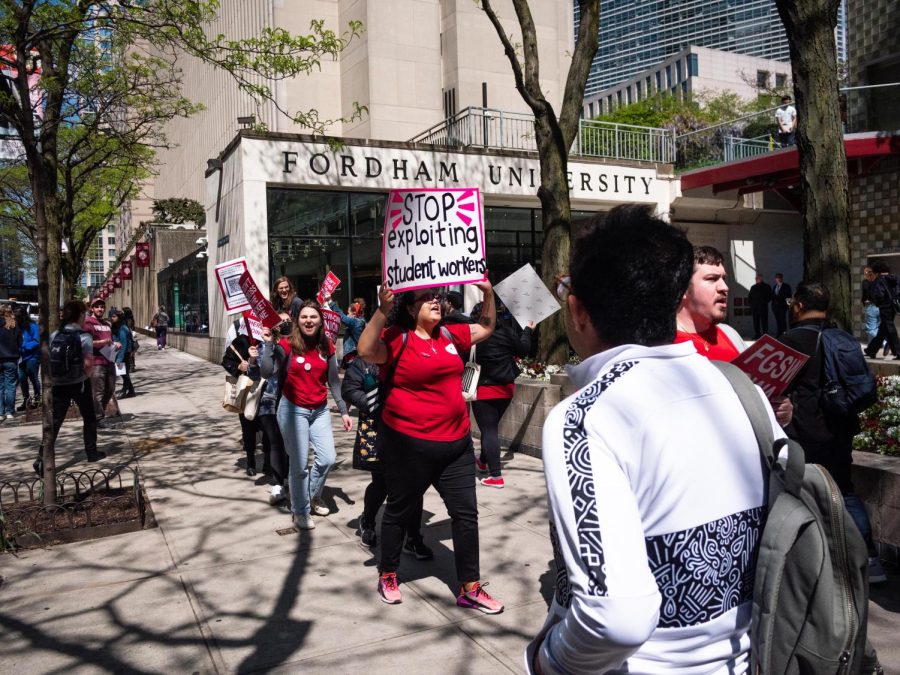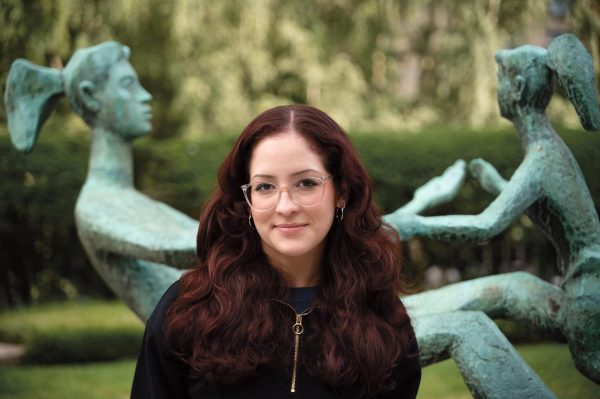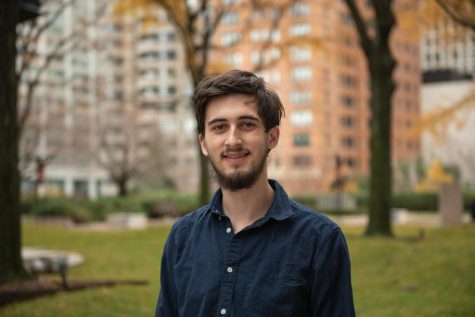FGSW Pickets and Rallies Across Campuses
Members of the union protested for two days and protested for three days in response to dissatisfaction with ongoing contract negotiations with the university
A graduate student worker holds up a sign calling on the administration to bargain with the union.
April 26, 2023
Fordham Graduate Student Workers (FGSW), the labor union representing 360 of the university’s graduate student workers in the Graduate School of Arts and Sciences (GSAS), walked out from April 24 to 26 following unsuccessful contract negotiations with the university. The union is demanding an increase in wages and more support for international graduate student workers, as well as workplace protections. FGSW’s proposed contract will be the first to be negotiated between the union and Fordham.
In an Instagram post released on April 20, FGSW shared that graduate students decided to walk out due to the university’s unwillingness to meet the union’s proposals after seven months of bargaining. The union also released their walkout schedule the same day.
Molly Crawford, a doctoral candidate in theology and member of the FGSW coordinating committee, said that although the union aims to make Fordham “stronger, safer, and more thriving,” she believes the university is not bargaining in “good faith.”
“My whole time as a graduate student has been a disheartening process of feeling like Fordham’s upper administration doesn’t care about me and only sees me as someone to teach classes for exploitative wages — rather than a scholar and professor who can contribute to the future of my field,” she said.
University President Tania Tetlow, J.D., addressed the Fordham community in an email on April 20 following FGSW’s announcement of the three-day walkout, in which she said she hoped the student workers would “reject” the call to walkout.
Her email also included a description of what Fordham currently offers most graduate student workers as well as an outline of their demands and why the university is unable to meet them.
“I think they attempted to portray (FGSW) as entitled and asking for things that are ridiculous.” Matthew Siebert, FGSW coordinating committee member
One day later, Dennis C. Jacobs, provost and senior vice president for academic affairs, sent an email to Fordham community members noting that the walkout would affect 3,000 students due to the cancellation of nearly 200 arts and sciences classes, representing approximately 9% of undergraduate classes taught at the university.
According to Bob Howe, associate vice president for communications, no classes beyond those taught by graduate students participating in the walkout were disrupted.
“We are very concerned that the effect of a work stoppage and the resulting loss of class time so late in the term would penalize undergraduate students who bear no responsibility for the negotiations between FGSW and the university,” he said.
Matthew Siebert, a doctoral candidate in theology and FGSW coordinating committee member, shared that he was disappointed by the president’s university-wide communication and said that he felt the union was being misrepresented.
“I think they attempted to portray (FGSW) as entitled and asking for things that are ridiculous,” he said.
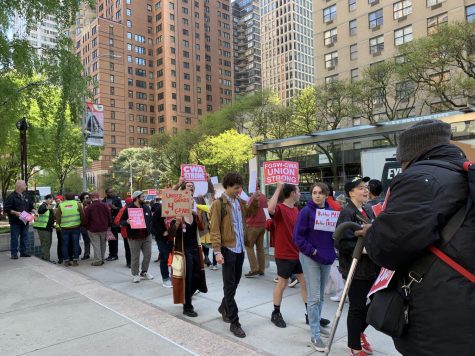
Siebert added that FGSW is walking out to show the support that graduate student workers have from others, including that of undergraduate students and the Communications Workers of America (CWA), a labor union representing FGSW since February 2022 through CWA Local 1104.
Numerous leaders across the New York metropolitan area have also expressed their solidarity, including Manhattan Borough President Mark Levine; New York City Councilmember for District 3 Erik Bottcher; New York City Council Candidate for District 1 Susan Lee; and New York City Comptroller Brad Lander.
“Hopefully this will show the administration that we’ve got all this support, and they’ll start bargaining with us and start trying to come to agreements with us at the bargaining table,” Siebert said.
Isaiah Shavers, Fordham College at Lincoln Center (FCLC) ’25, joined the picket line on April 24 and described the situation that the graduate student workers are in as “horrible.” He added that he believes Fordham “has no excuse” to raise tuition while denying FGSW’s demands.
“The reason we’re learning anything that we are, it’s not the Fordham administration teaching us, it’s them. It’s the graduate students; it’s the teachers,” he said. “Those are the people that run this university.”
Graduate student workers develop research, provide research assistance and faculty support, and teach classes at the university. The student workers commit to nine months of part-time work capped at 19 hours per week.
According to Tetlow’s email, the university generally offers doctoral candidates and master’s degree students in the humanities, social sciences and sciences full-tuition scholarships, health insurance supplements and stipends ranging from $26,567 to $32,902.
In FGSW’s summary of their proposal, the union is asking for a minimum stipend of $60,000 dispersed over 12 months instead of nine or 10. Other proposed benefits include campus parking passes for all graduate workers.
Tetlow claimed that the total for the demand for increased compensation and scholarships would exceed the top 20% of U.S. incomes, which is $130,000.
Carolyn Cargile, a doctoral candidate in English who was on the picket line on April 24, said that graduate student workers do a lot of work for the university while experiencing food insecurity, housing insecurity and more.
“The walkout is a way of telling the administration that our work is really integral to the mission of the university and that we deserve fair treatment and compensation,” Cargile said.
The union is also asking for more comprehensive benefits and protections for international graduate students, including “reasonable” paid time off for attending immigration proceedings, guaranteed housing, and a one-credit extended orientation course the summer prior to full-time enrollment to support the process of visa and social security applications, housing and building a support network.
“It would effectively require us to redirect the tuition dollars paid by undergraduates and other graduate students to provide full, personal financial support for the 360 students represented by this union.” University President Tania Tetlow, J.D.
Amal Zaman, an international graduate student and member of the FGSW bargaining committee, explained that international student workers experience difficulties getting paid on time due to challenges with being able to quickly attain a social security number (SSN).
“The university does not utilize alternate ID and bank letters in place of social security numbers,” Zaman said. “So international graduate workers are sometimes waiting for months to receive their SSNs and thus their compensation. The university has rejected our proposal which stated that the university will pay them on time by utilizing alternate identification.”
Other demands include guaranteed summer funding or employment, a legal assistance fund to support visa, tax and social security applications, and a housing guarantor subsidy to help students whose income may be insufficient to secure housing on their own.
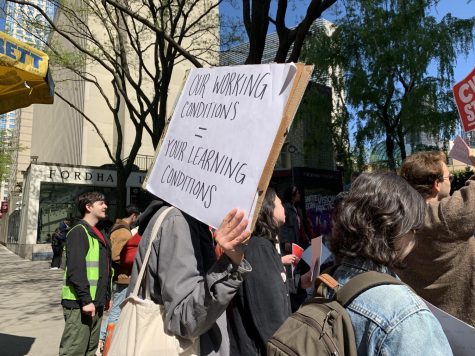
Their proposal also outlines the prohibition of nondisclosure agreements, establishment of a childcare subsidy for those with children under five years of age, and work assignments communicated to graduate students no fewer than 10 weeks prior to their start date.
FGSW is also asking for changes to discipline and discharge standards, demanding that they should not be disciplined or let go without “just cause,” which would mandate that Fordham provide proof of a terminated worker’s conduct meeting the required standards for termination. Another demand is access to university-provided and funded resources like printing, laptops and teaching software.
In her email to the Fordham community, Tetlow expressed that while the university understands the desire for a living wage, affordable housing and free childcare, Fordham is in disagreement with FGSW’s expectations.
“It would effectively require us to redirect the tuition dollars paid by undergraduates and other graduate students to provide full, personal financial support for the 360 students represented by this union,” Tetlow said.
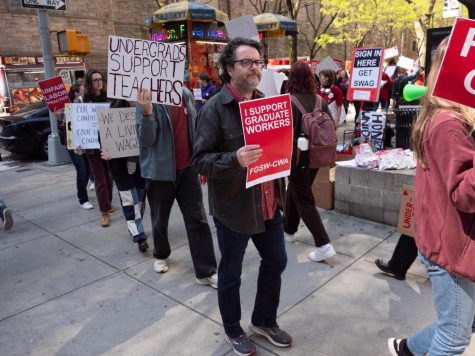
Graduate student workers first approved a vote to unionize in April 2022 and sent a “demand to bargain” to the university on Sept. 6, 2022. FGSW and Fordham have been negotiating the first contract since October 2022, and, as of March 27, they have held over 10 bargaining sessions.
Zaman explained that she would like to see Tetlow directly involved in the negotiations and feels that the union’s demands are not taken seriously.
“I would like to see President Tetlow at the table, engaged in good-faith bargaining, taking seriously the demands of hundreds of people as a starting point for problem-solving rather than her lawyer’s union busting and attempting to force a contract onto its workers that will worsen their conditions,” Zaman said.
Howe did not comment on the union’s specific demands or the university’s negotiating position.
“We are in active negotiations with the graduate student union and are optimistic we will reach an agreement,” Howe said. “You should know that it can take a year or more to negotiate the first contract with a new bargaining unit.”
FGSW and those in solidarity with the union will remain on the picket line until April 26, which Siebert encourages students to join. There will also be a closing rally held at the Rose Hill campus on April 26 at 3 p.m. to conclude the walkout.
“We’re really doing this to improve Fordham, and that includes the education of undergrads,” Siebert said. “A lot of what we’re asking for is so we can better educate at this university, because that is what we are paid to do.”
Insiya Gandhi and Jillian Arena contributed additional reporting to this story.

